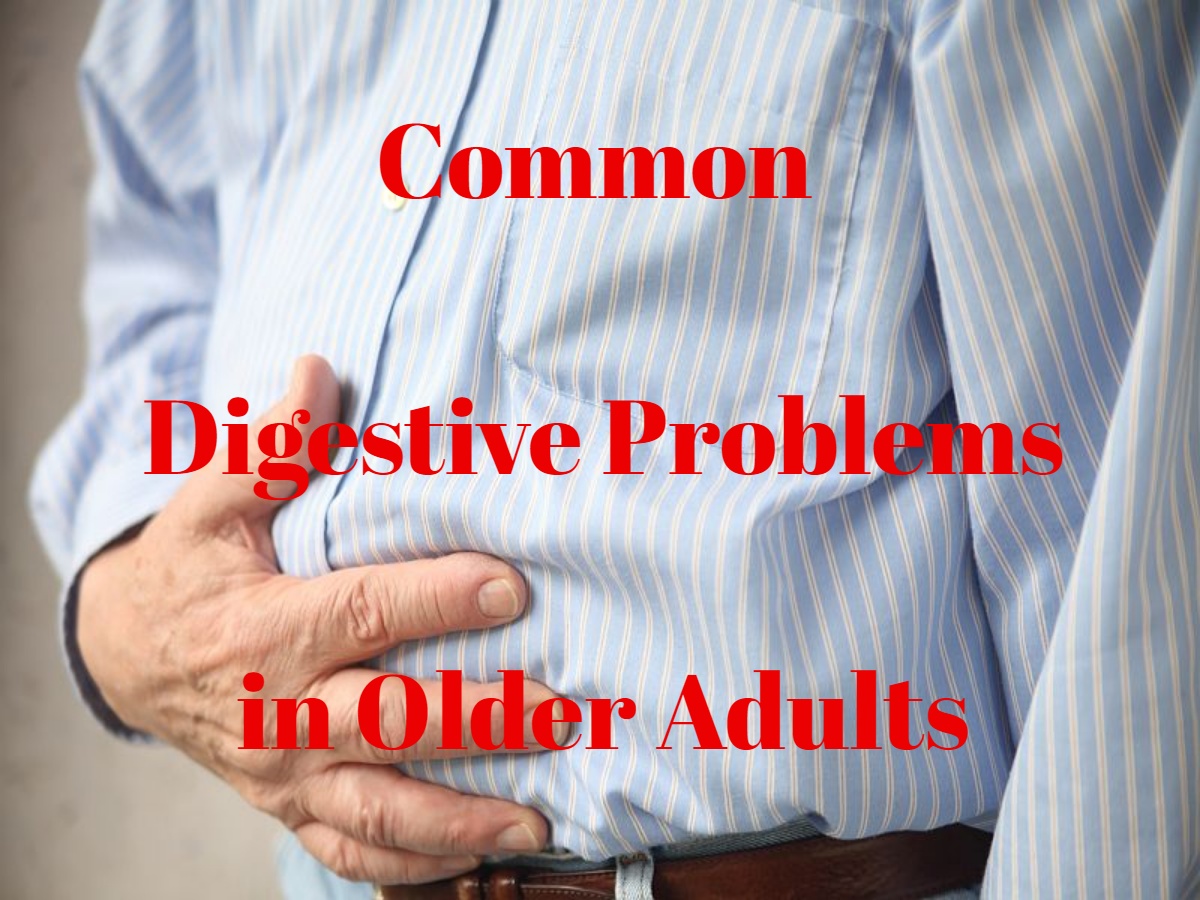Digestive Problems in Older Adults!
With aging, the body undergoes various changes, including those affecting the digestive system. Digestive problems are prevalent among older adults and can significantly impact their quality of life. Understanding the common digestive issues that affect this demographic is crucial for effective management and improved well-being.
Table of Contents
Common Digestive Issues in Older Ages:

- Constipation:
- One of the most prevalent digestive complaints in older adults is constipation.
- It is characterized by infrequent bowel movements, difficulty passing stools, and straining during bowel movements.
- Constipation can lead to discomfort, bloating, and even more severe complications if left untreated.
- Factors contributing to constipation in older adults include reduced physical activity, inadequate fluid intake, dietary factors, and certain medications.
- Gastroesophageal Reflux Disease (GERD):
- GERD is a chronic digestive disorder that occurs when stomach acid flows back into the esophagus, leading to symptoms such as heartburn, regurgitation, and chest pain.
- Older adults are at an increased risk of developing GERD due to age-related changes in the muscles and tissues of the digestive tract.
- Factors such as obesity, hiatal hernia, and certain medications can also contribute to GERD in this population.
- Diverticulosis:
- Diverticulosis is a condition characterized by the presence of small pouches, called diverticula, in the walls of the colon.
- While diverticulosis itself may not cause symptoms, it can lead to complications such as diverticulitis (inflammation of the diverticula), which can cause abdominal pain, fever, and changes in bowel habits.
- Aging is a significant risk factor for the development of diverticulosis, and dietary factors such as low fiber intake and high red meat consumption may contribute to its progression.
- Irritable Bowel Syndrome (IBS):
- IBS is a functional gastrointestinal disorder characterized by abdominal pain, bloating, and changes in bowel habits.
- While the exact cause of IBS is unknown, factors such as altered gut motility, visceral hypersensitivity, and changes in the gut microbiota may play a role.
- Older adults with IBS may experience exacerbations of symptoms due to age-related changes in digestion and metabolism.
- Dysphagia:
- Dysphagia refers to difficulty swallowing, which can occur due to various underlying conditions, including neurological disorders, esophageal strictures, and age-related changes in swallowing function.
- Older adults with dysphagia are at an increased risk of aspiration pneumonia and malnutrition if not properly managed.
Causes of Digestive Problems:

- Age-related Changes:
- As individuals age, various physiological changes occur in the digestive system.
- These changes may include a decrease in digestive enzyme production, slower gastrointestinal motility, and reduced muscle tone in the digestive tract, leading to impaired digestion and absorption of nutrients.
- Medications:
- Older adults often take multiple medications to manage chronic conditions, and some of these medications can have side effects that affect the digestive system.
- For example, certain drugs may cause constipation, diarrhea, or exacerbate symptoms of gastroesophageal reflux disease (GERD).
- Dietary Factors:
- Poor dietary habits, such as consuming a diet low in fiber, high in processed foods, or rich in fats and sugars, can contribute to digestive problems such as constipation, bloating, and indigestion.
- Lifestyle Factors:
- Sedentary lifestyles and lack of physical activity can slow down bowel movements and contribute to constipation and other digestive issues in older adults.
- Underlying Medical Conditions:
- Chronic conditions such as diabetes, thyroid disorders, inflammatory bowel disease (IBD), and neurological disorders can affect digestive function and lead to symptoms such as abdominal pain, diarrhea, and changes in bowel habits.
Managing Digestive Problems in Older Adults:
Effective management of digestive problems in older adults requires a multidisciplinary approach that addresses both medical and lifestyle factors:

- Dietary Modifications:
- Encouraging a diet rich in fiber, fruits, vegetables, and whole grains can help alleviate constipation and promote regular bowel movements.
- Limiting intake of trigger foods such as spicy foods, caffeine, and alcohol can help manage symptoms of GERD and other digestive disorders.
- Hydration:
- Adequate hydration is essential for maintaining digestive health and preventing constipation.
- Older adults should be encouraged to drink plenty of water throughout the day.
- Regular Exercise:
- Physical activity stimulates bowel movements and promotes overall digestive health.
- Encouraging older adults to engage in regular exercise, such as walking or yoga, can help alleviate symptoms of constipation and improve digestion.
- Medication Management:
- Reviewing medication regimens with healthcare providers can help identify and address drugs that may contribute to digestive problems.
- Adjusting dosages or switching medications when appropriate can minimize side effects.
- Medical Interventions:
- In some cases, medical treatments such as proton pump inhibitors, laxatives, or dietary supplements may be prescribed to alleviate symptoms and manage underlying digestive conditions.
When to See a Doctor:
Knowing when to seek medical attention for digestive problems is essential for timely diagnosis and treatment, especially for older adults who may be more susceptible to complications. Here are some indications of when it’s appropriate to see a doctor:
- Persistent Symptoms:
- If digestive symptoms such as abdominal pain, bloating, constipation, diarrhea, or heartburn persist for more than a few days despite home remedies or over-the-counter medications, it’s advisable to seek medical evaluation.
- Unintended Weight Loss:
- Significant and unintentional weight loss without changes in diet or physical activity can be a red flag for underlying digestive disorders, malabsorption issues, or even cancer.
- Consultation with a healthcare professional is warranted in such cases.
- Severe Symptoms:
- Symptoms that are severe or progressively worsening, such as severe abdominal pain, vomiting, rectal bleeding, or difficulty swallowing, require immediate medical attention as they may indicate serious conditions like gastrointestinal bleeding, obstruction, or perforation.
- New Onset of Symptoms:
- If you experience new or unusual digestive symptoms that are concerning or interfere with daily activities, it’s advisable to consult a healthcare provider for evaluation and appropriate management.
- Medication Side Effects:
- If you suspect that the medications you’re taking are causing digestive problems or if you experience new digestive symptoms after starting a new medication, discuss these concerns with your doctor to determine if adjustments to your medication regimen are necessary.
- Age-related Concerns:
- Older adults may be at higher risk of complications from digestive issues due to age-related changes and comorbidities.
- Therefore, it’s important for older adults to seek medical attention promptly for any digestive symptoms that arise.
- Chronic Health Conditions:
- People with chronic health conditions such as diabetes, inflammatory bowel disease (IBD), or autoimmune disorders may require specialized care for managing digestive symptoms.
- Regular follow-up with healthcare providers is crucial for optimizing management and preventing complications.
- Family History:
- If you have a family history of gastrointestinal conditions such as colon cancer, Crohn’s disease, or celiac disease, it’s important to be vigilant about any digestive symptoms and discuss screening and preventive measures with your doctor.
Conclusion:
Digestive problems are common among older adults and can significantly impact their quality of life if left untreated. By understanding the common digestive issues that affect this demographic and implementing appropriate management strategies, healthcare providers can help older adults maintain optimal digestive health and overall well-being as they age. Encouraging healthy lifestyle habits, dietary modifications, and regular medical follow-up can help mitigate the impact of digestive problems and improve the quality of life for older adults.









